Find Your Shine

As Ohr Yisroel in Tenafly, NJ opens its doors this week, Rabbi Scott Friedman knows his own success can be accessed by anyone
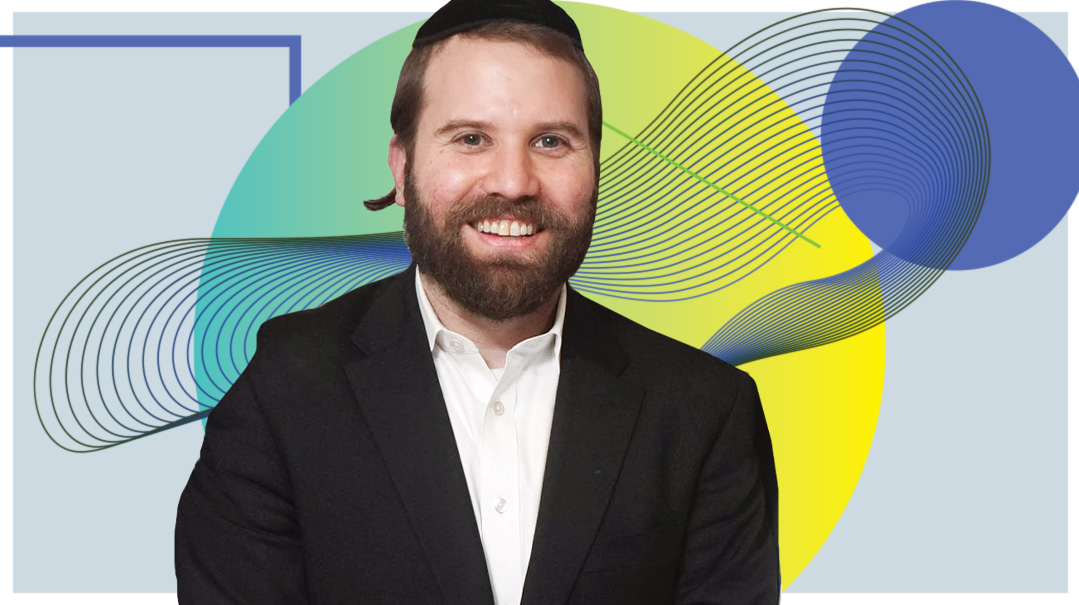
Photos: Mordechai Hahn
Rabbi Scott Friedman, head of school for the nascent Yeshiva Ohr Yisroel in Tenafly, New Jersey, never dreamed that he would dedicate his life to inspiring the kind of religiously alienated teen that he himself once personified.
He describes his Jewish education as mostly cultural and his grade school performance as religiously disengaged and apathetic.
“I was completely disconnected. I felt that they were teaching us from meaningless, archaic books, like I could have as easily been learning in Japanese. The rabbanim couldn’t convey any meaning to me,” he reflects on those early elementary school years. High school downgraded his feelings about frumkeit from “irrelevant to downright painful.”
Today, this yeshivah founder, experienced rebbi, Columbia University-educated therapist, and former religiously disenchanted teen, has created and runs a high school where he fearlessly embraces out-of-the-box methods in order to infuse his students with a lifelong love for learning. Rabbi Friedman believes that his personal journey is not unique, and that his eventual success, the life balance he’s created, and the deep, meaningful relationship he’s forged with Hashem, can be accessed by all young people, just as it was by him.
Leaning on the support and guidance of daas Torah, including Rav Yerucham Olshin, Rav Shmuel Kamenetzky, Rav Elya Brudny, Rav Avrohom Schorr, and Rav Menachem Zupnick, Rabbi Friedman’s goal is to provide disconnected or marginalized kids with that “Aha!” moment that will turn them on to Torah and mitzvos.
Rabbi Friedman’s personal experience attests to how many contemporary high school students feel disenfranchised and indifferent to Torah learning. His previous years of experience as a rebbi who followed up with his graduates showed him that the ubiquitous “year in Israel” is often eaten up by an initial stage of partying, followed by a too-short period of growth and inspiration. On that basis, he and his colleagues at Ohr Yisroel believe that this growth process should be accelerated — that the “Eretz Yisrael inspiration” should be provided earlier, at the high school level.
Although he was a successful rebbi at Torah Academy of Bergen County, in 2020 he partnered with Rabbi Asher Yablok, his colleague and former head of school at TABC, and Dr. Joe Rozehzadeh as board chair, to create a yeshivah high school designed to mirror the Israel yeshivah experience more closely and to help talmidim rebuild a relationship with Hashem that would turn around their attitude and approach to learning. In creating Yeshiva Ohr Yisroel of Tenafly, Rabbi Friedman’s goal was to create an environment for talmidim that would be completely lishmah.
“You can’t make someone learn, but you can teach him to love learning, so he’ll do it for the rest of his life,” Rabbi Friedman says. “We want to make a connection with their hearts and souls, so they’ll have the confidence to believe in themselves. If you can show them the love and the beauty, they’ll stay with it. We want to create lifetime learners.”
Perusing the student body of this school, whose first class entered in 2020, one might think that it’s a bit of a stretch, but Rabbi Friedman really believes in his students — and because he does, so do they. Because, he explains, “when they connect to that place of self-acceptance and inner joy, they’ll be willing and even happy to stretch themselves a bit further.”
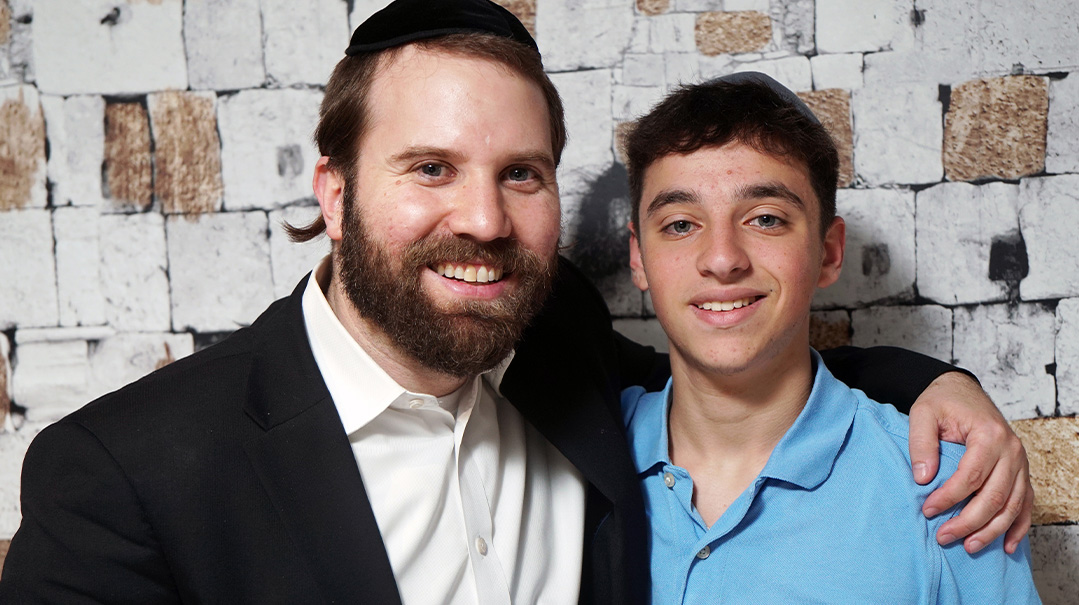
IT was with these lofty goals in mind that Rabbi Friedman carefully chose the name for his emerging yeshivah. ‘Ohr’ echoes the name of an institution he considers life-changing: Migdal Ohr, the famous Israeli network of educational institutions founded by Rabbi Yitzchak David Grossman. Rabbi Friedman has a close relationship with Rabbi Grossman and wanted Ohr Yisroel to convey the same unconditional love upon which Rabbi Grossman’s chesed empire is based. There is a special tefillah Rabbi Grossman says every day, asking HaKadosh Baruch Hu to protect him from judging others and asking for His help in only seeing the good in others. (Last year’s graduating class of Ohr Yisroel received a framed version of this tefillah as a parting gift.) The ‘Yisroel’ in the yeshivah’s name reflects two great individuals — Rav Yisrael Baal Shem Tov and Rav Yisrael Salanter — who defied the naysayers and changed the world through chassidus and mussar.
For over 15 years, Rabbi Friedman was a school therapist and beloved, if unconventional, limudei kodesh rebbi at Torah Academy of Bergen County (TABC). He never gave his students tests or homework, contending that learning, davening, and growth can never be quantified by a number or a score. The goal was to teach a love for Torah and learning — and that is not something that a school can ever force on a student.
And he still doesn’t give tests or homework for limudei kodesh, which is one of the hallmarks of the new yeshivah. “Every year I get pushback from some parents about our policy of not grading limudei kodesh,” says Rabbi Friedman. who understands their worries but finds that mostly, parents’ preoccupation with grades is really about control. “Parents are understandably frustrated and afraid of letting their kids find their way alone and are trying to maintain some kind of authority.
“I have a good friend whose son is a straight-A student,” Rabbi Friedman relates, “and when he heard about our new yeshivah and the curriculum, he cornered me. ‘Scott, is it true that you’re opening a school for kids without homework, tests, or grades in limudei kodesh? Are you crazy? How will anyone ever learn anything in such a place?’ ”
Rabbi Friedman believes that today’s kids are seeking answers at younger and younger ages, and it’s better to work with them than to ignore what’s happening in their inner world. He’s had parents tell him that they had a perfect kid who, overnight, did a 180-degree turn and is now precipitously sliding downward. But, Rabbi Friedman asserts, “No one does a 180-degree turn. There was stuff going on before, and the boys were not being heard for what was happening internally.”
Rabbi Friedman told him that that was the whole point. Even a kid who’s getting straight As, what happens to him after the test? How much is about acing the material, and how much is about connecting to something holy and geshmak? “I want all my talmidim to know and really feel that learning is a gift — a pleasure and not a burden. It’s not something you do for a grade, it’s something you do for the rest of your life.”
Rabbi Friedman quotes mussar movement founder Rav Yisrael Salanter ztz”l in describing an extreme case of the failure of controlled compliance with none other than Cossack soldiers. These conscripts lived supremely regimented lives for the tens of years they were forced into service. After decades, when they were finally released, many fell apart and became lawless drunkards. Why? Because for years they were virtually imprisoned. Their bodies were compliant, but their hearts and minds were far away, yearning for freedom.
“You can’t force a relationship, and you can’t force devotion. All you can force is immediate compliance,” Rabbi Friedman explains. “And for our purposes, that means that if you build a loving relationship with the Torah, that relationship will last a lifetime, but not if it’s a forced relationship.”
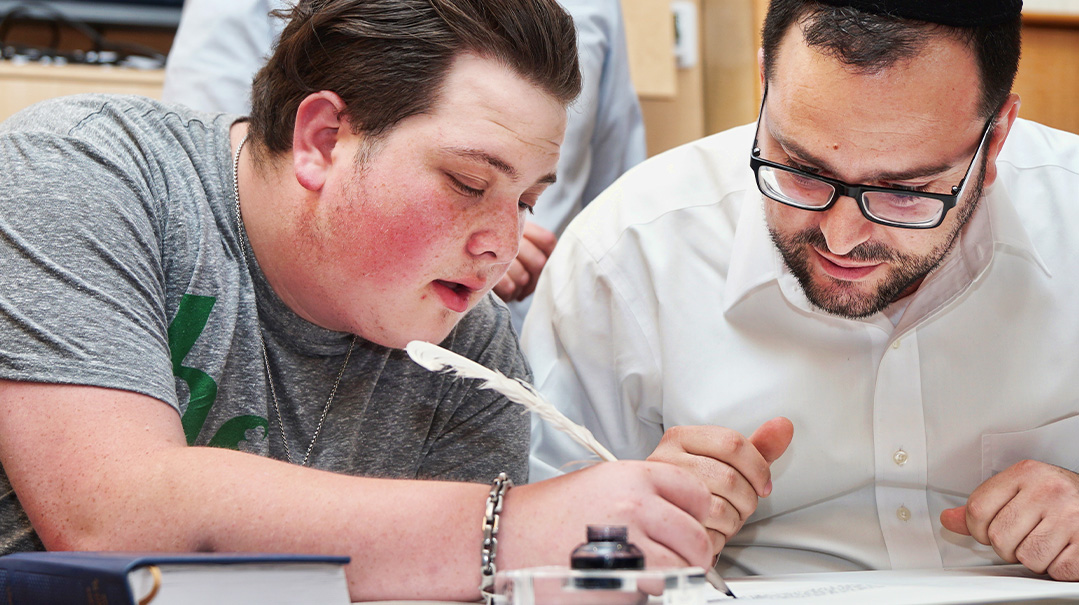
After graduating from high school, Rabbi Friedman spent a transformative year at a yeshivah in Eretz Yisrael, and then, in what could only be called a meteoric rise, spent the next few years learning in Ohr Somayach and Mir. Yet despite the high level of learning he achieved, he was left feeling burnt out and depleted. He recognized that, shteiging away as he was, he was also using his learning in part as a way of filling a certain emotional emptiness. He was searching for something to fill that void, and eventually transferred to Aish HaTorah in Jerusalem’s Old City where he would find answers, balance, and lifetime mentors.
Rabbi Noach Weinberg’s signature message that Hashem loves every Jew unconditionally and that the Torah is His greatest gift to us, redirected Rabbi Friedman’s mindset and, he admits, “turned things on its head.” And there he met and connected with Rabbi Gedalia Rosen, a rav and experienced therapist, who was able to help Rabbi Friedman unlock the parts of himself that were holding him back. In the process, Rabbi Rosen taught him a lesson that would continue to give him perspective to others in crisis: that so much of what gets into people’s way religiously is emotional.
Rabbi Friedman, together with a friend, initially came to Rabbi Rosen seeking answers to their existential queries — and they were core questions: Does Hashem exist? Is He really Omnipotent? Is the Torah true? Rabbi Rosen answered with his own enlightening question: “Do you want answers, or do you just want to ask questions?” This startled Rabbi Friedman, who admits that “that moment changed my life. It forced me to look inside myself and define my real goals.”
Not only did Rabbi Rosen show him that Hashem exists beyond a shadow of a doubt, he taught him an almost equally important concept: Our emotions impact our beliefs. A person believes what he believes because of the way he feels.
“When I realized what bothered me emotionally,” he relates, “I was able to reach a stage of permanent religious stability.”
Eventually, Rabbi Friedman decided to become a therapist himself, with the goal of helping young people navigate their emotional world and, as a result, enabling them to develop a relationship with Hashem.
“I never really intended to become a practicing therapist,” he says, “but instead, to be a qualified rebbi who could address the whole of my students’ needs.”
When Rabbi Friedman returned to the United States after his years in Eretz Yisrael, he attended Columbia University and worked the night shift at a drug rehab. It was there that he learned another powerful lesson that would serve him later as a mechanech and mentor to struggling bochurim: not to use incentives as a primary motivator. While the assumption is that incentives will motivate one to perform for a reward and that person will refrain from performing certain actions if they lead to negative consequences, Rabbi Friedman doesn’t believe there are long-term benefits to this approach, especially if they’re motivated by control. He relates how a teen at the rehab misbehaved and was punished by having his music confiscated. This was considered a very stiff penalty because there is very little a patient can call his own in a rehab setting, and his music was important to him. When the teen fulfilled the criteria to reclaim his music, he approached the people in charge and asked for its return. But that day, the supervising doctor had called in sick, and the teen was ignored when he suggested calling the supervisor at home or asking a different staff member to release his device. At the time, Rabbi Friedman was appalled at the lack of empathy or proper prioritizing the authorities showed for their patient — because it made treatment about control. There was no effort made to come toward the patient with an understanding of his world, and what was important to him was seen as irrelevant.
Dealing with addiction in those early therapy days, Rabbi Friedman learned another powerful lesson: that when someone is in the grip of an addiction, running away from his problems, self-medicating, and avoiding his painful feelings, he’s not emotionally present and generally not reachable for help.
“And herein lies the secret sauce,” he says. “Every human being behaves rationally based on his personal set of experiences, even though it might look strange to others. And that’s why you can never judge another person — because if you were in his shoes and experienced what he experienced, you’d probably do the same.”
Rabbi Friedman tells me about a former student, a teen he met with who came in stoop-shouldered and disconsolate. The student shared that he had been bullied throughout his school years. Rabbi Friedman asked him how he responded to the bullying, and the teen told him that he stayed at home alone most of the time, while his parents blamed him for his own social failures because he stayed indoors alone and didn’t socialize. Rabbi Friedman asked him how that made him feel, and the response was instant and succinct: “I felt like a freak.”
“I told this boy that if he wouldn’t have felt like a freak, he would really have been a freak,” he says, and he elaborates with a realization he had a few years back while boarding a train to MetLife Stadium for the Siyum HaShas. Security was on high alert, and the trains and platforms were manned by a strong police presence — think big guys, big guns, and dogs. His first thought was that the scenario looked too much like Nazi Germany for his comfort. But that thought was quickly overridden by one of gratitude for living in a free country that worked to protect all its citizens. “But let’s say I was a war-torn refugee and had been faced with the same scene?” Rabbi Friedman asks. Under those circumstances, it would have been completely normal to panic, although the average bystander would not have understood and would have thought that refugee was unstable.
Rabbi Friedman has had some important and influential mentors throughout his years as a psychologically-attuned mechanech. One of them is Rabbi Dr. Benzion Sorotzkin, a Brooklyn psychotherapist for adolescents and adults and a prolific author, who emphasizes that to help a young person in crisis, the focus needs to be on that person’s inner world, not on his behavior. Rabbi Friedman shares a story about having counseled a student who was grieving over the death of his special-needs sibling. He came to Rabbi Friedman broken-hearted and asked why Hashem would take the life of such an innocent young person. But the question Rabbi Friedman really heard was, “Do you have an answer that will make my pain go away?” As a student of Dr. Sorotzkin, Rabbi Friedman perceived that there was a huge difference between what the teen shared and what was really going on in his head. He wasn’t really questioning Hashem; he was expressing his own anguish.
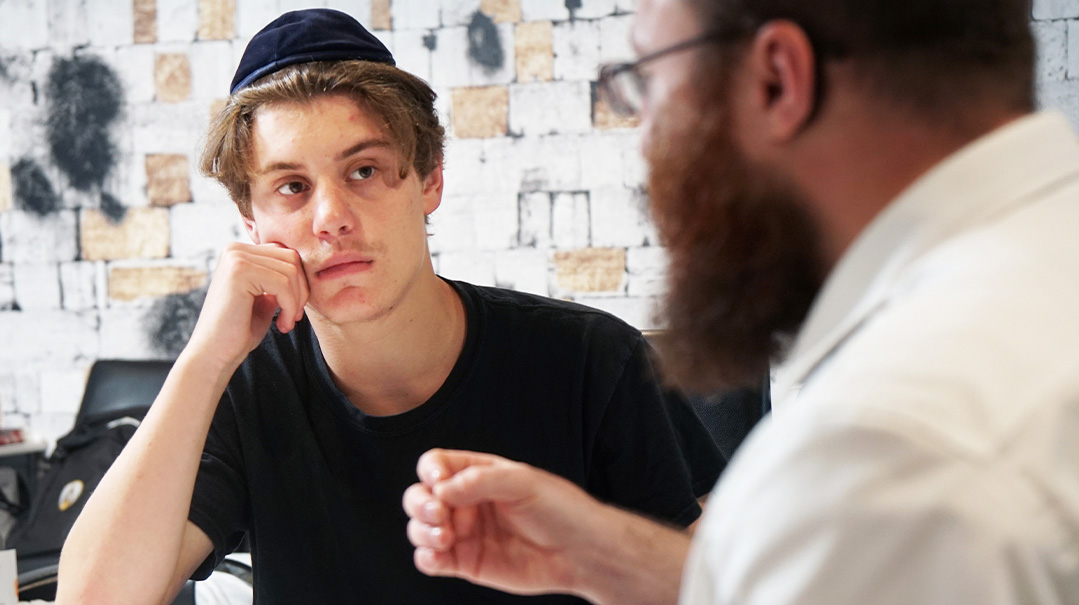
Sharing stories of his own youth, it is clear to see how Rabbi Friedman learned a language to connect with the contemporary teen. He shares that his father was all about unconditional love and self-worth and was a man who was psychologically ahead of his time. When it came time for high school, Rabbi Friedman’s parents enrolled him in boys-only yeshivah high school that was more right-wing than he preferred. He had a nasty fight with his father about it, but after he calmed down, he approached his father to apologize. “It’s all right,” his father told him. “You’re allowed to get upset. You don’t have to apologize. People get angry sometimes.”
“My mother is outgoing, goodhearted and everybody’s friend, and my father never worried about what others thought of him and allowed me to grow up to think for myself,” says Rabbi Friedman, who counts himself fortunate to have inherited his parents’ combination of skills and approaches.
When he was a teenager struggling with the world around him, where most parents would discipline or serve up a hefty dose of tough love, his father did something unusual: “He built me my own room in the back of the house and gave me my own key to the door.” Rabbi Friedman shares that this private, safe space gave him the opportunity to mature and face himself.
Today, Rabbi Friedman models that experience to his own students, as “everyone gets a key to his own door.” If they want to do mitzvos, the message is that they are fortunate and privileged. And if they don’t? “We love them anyway. A person who is struggling needs more love, not less.”
Walk into Ohr Yisroel, and you’ll see that these concepts aren’t just preached, but practiced. Mornings at Ohr Yisroel will find students in a recently renovated beis medrash learning, connecting, and growing with their rebbeim. But afternoon classes are structured a little differently: They’re held in rooms with no desks. Instead, they’re furnished with tables and leather benches, giving a lounge-like vibe. There are no offices or teachers’ room, so that there remains a fluidity between the students and the staff. In place of offices, communal conference rooms are available for everyone’s use, with rebbeim getting first rights. A shared kitchen and lounge serve staff and students alike.
Many of today’s yeshivos are built for the “alef”student — they’re willing to take in others, but they’re aiming for the top tier. And then there are other schools that cater to the poorer students. Rabbi Friedman says that Ohr Yisroel is really a yeshivah for everyone else, “because you can’t serve fast food and a gourmet menu at the same place.”
He’s careful to emphasize that the yeshivah is not only for the uninspired or for turned-off or burnt-out bochurim. “It’s really for any bochur,” he says. “We’re just not running after the ‘alef’ talmidim, although it might work for them as well. For us, every talmid is truly the same.”
Much of the current student body are boys from Modern Orthodox homes, some students are from chareidi backgrounds – both Litvish and chassidish – but have found themselves religiously uninspired and disconnected. It might sound like a bumpy mix, but under Rabbi Friedman’s leadership, the students have created a strong and cohesive brotherhood.
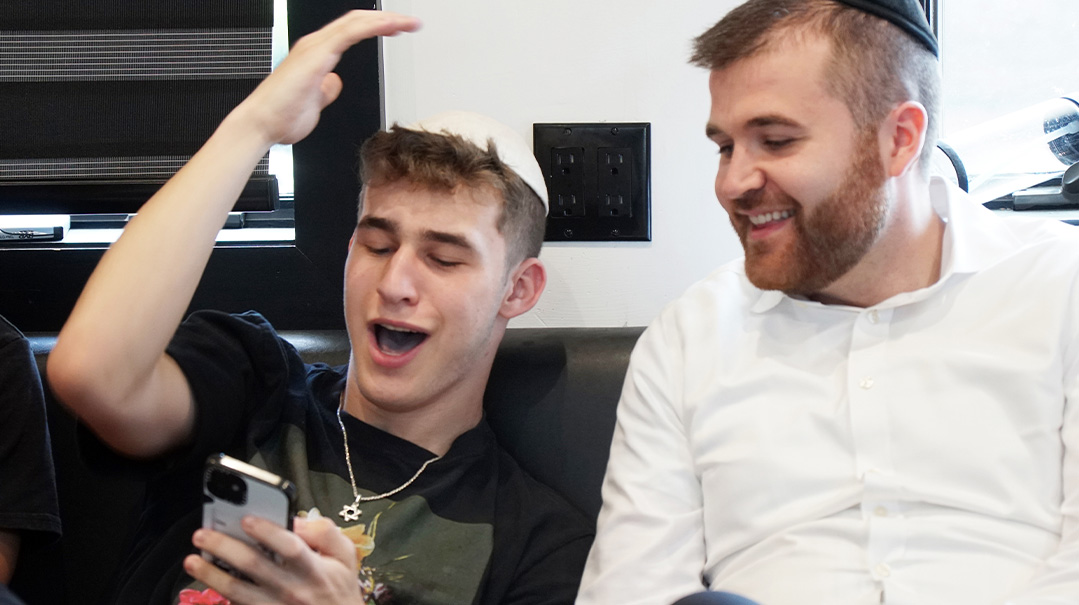
Rabbi Friedman founded Ohr Yisroel two years ago with the generous support of Rabbi Mordechai Shain of Chabad of Tenafly, who allowed the new yeshivah use of its comfortable and spacious shul building. Its original student enrollment of 20 has shot up to close to 80, an exciting statistic for the yeshivah but one that also threatens to upend the personal, intimate environment of the yeshivah and its culture of warmth, achdus, and growth. The solution is on the desk in front of Rabbi Friedman: blueprints to the new 35,000 square foot building in Teaneck, New Jersey that is under contract and will become the school’s new home. Building plans include space for a music room, gym, and other amenities. The building will always be accessible to students so that they’ll feel it’s really a home for them. The yeshivah has made itself a ceiling on growth — 200 students.
And if enrollment exceeds 200? “We’ll start another school,” Rabbi Friedman says. He’s grateful to the yeshivah’s executive director Rabbi Yitz Greenman, the legendary Aish HaTorah builder and fundraising master, who partnered with him this past year and who’s pushing him to the next phase, and to the Gerszberg family, who are turning the dream of a new campus into a realistic vision.
This Elul bears proof of Ohr Yisroel’s evolution: A yeshivah gedolah has been launched to welcome young men who are returning from Israel, with Rabbi Moshe Don Kestenbaum and Rabbi Menachem Zupnick serving as roshei yeshivah, and Rabbi Shia Stern as a dynamic maggid shiur.
The future Teaneck location is only a few miles from Rabbi Friedman’s home in Passaic, where he lives with his wife Dina, who put her career as a speech therapist on hold to bring up their children and support her husband’s goals. Rabbi and Mrs. Friedman have created blueprint plans to open a parallel school for girls under the auspices of Mrs. Friedman and Mrs. Leah Greenman, executive director of the Ahavas Yisrael Women’s Project.
For Rabbi Friedman, it’s all about carrying forward his own experiences and healing, inspiring a new generation of boys to find meaning and purpose in their own learning journey. “I’m not trying to achieve another check of approval by making another boy frum, though I’m hoping that’s what they’ll all choose,” Rabbi Friedman says. “Here, it’s about helping people own their own lives, make their own choices, and realize their own talents and greatness.”
(Originally featured in Mishpacha, Issue 927)
Oops! We could not locate your form.







